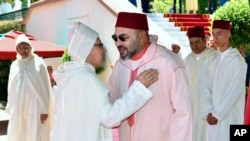The monarch is credited with effectively maintaining stability in a volatile region — in part through suppressing criticism — as well as modernizing the economy and pursuing assertive diplomacy.
But his efforts have fallen short in addressing the profound inequalities that continue to plague Moroccan society.
In his latest speech on July 30, the king called for "achieving new milestones on the path of progress and creating projects of greater scope, worthy of the Moroccan people."
Since his coronation following the death of his father Hassan II on July 23, 1999, the monarch has retained a firm grip on economic policy, foreign affairs, and defense and security in his North African nation.
"While his father was greatly present on the political stage, Mohammed VI's style is different. He prefers to silently steer the ship while controlling the levers of power," said political analyst Mohamed Chiker.
King Mohammed has led major infrastructure and business projects over the years.
They include the Tanger Med industrial port, the gigantic Noor solar power plant and the Tangier-Casablanca high-speed rail line, alongside developing Morocco's automotive and aerospace industries, and more recently, so-called green hydrogen projects and the "Made in Morocco" label.
And in an effort to boost Moroccan soft power abroad, he took the initiative to partner with Spain and Portugal in a joint bid to host the 2030 FIFA World Cup.
Western Saharan 'prism'
On the international stage, Mohammed VI has diversified partnerships that were once primarily focused on former colonial ruler France and other European countries, embracing a more prominent role on Morocco's continent since its return to the African Union in 2017.
Western Sahara has remained the king's top foreign policy priority, repeatedly dubbing the former Spanish colony under dispute as "the prism through which Morocco views its international environment."
Since 1975, a low-intensity conflict over the contested territory has pitted Rabat against Sahrawi separatists of the Algeria-backed Polisario Front.
Morocco has secured Spain's support for an "autonomy plan" that would place the vast mineral-rich desert region under Rabat's sole sovereignty.
The Polisario has for decades called for a United Nations-supervised referendum on self-determination.
In December 2020, the United States recognized Morocco's sovereignty over Western Sahara. Israel followed suit last month, deepening ties with Rabat and drawing backlash from Algiers.
While achieving diplomatic wins, Mohammed VI, once earning the nickname "king of the poor," has addressed societal inequalities at home at a sluggish pace.
'Highly controlled'
Gaps between rich and poor, as well as urban and rural areas, continue to widen in today's Morocco.
A report commissioned in 2019 by Mohammed VI to find a "new development model" noted growing "inequalities," a "slow pace of reforms" and "resistance to change."
"The top 10% of the wealthiest Moroccans still hold 11 times more wealth than the bottom 10%," said the report.
The effects of the COVID-19 pandemic coupled with inflation have brought poverty rates in Morocco to levels last seen in 2014, according to the governmental High Commission for Planning.
Morocco ranks low on the U.N. Human Development Index in education, literacy rates and gross income per capita.
Mohammed VI has still enjoyed broad popular support as the latest head of the Alawi dynasty that has ruled Morocco for centuries and is said to be descended from Islam's Prophet Mohammed.
Under his leadership, a long-awaited aid project for Morocco's most disadvantaged families is expected to be completed by the end of the year.
In 2004, the monarch greenlit the adoption of a family code aimed at boosting women's rights, though falling short of the full extent of activists' demands.
His regime, meanwhile, has been criticized for restricting freedom of expression by targeting and at times imprisoning opponents, journalists and dissenting internet users.
Tighter security measures under Mohammed VI — also pursued in the name of counterterrorism efforts after May 2003 attacks that killed 33 people in Casablanca — reversed a liberalization push in the late days of Hassan II's reign.
While social media have given a platform to a variety of voices, traditional news outlets operate either under tight control or not at all.
Political opposition in the kingdom has been weakened or marginalized.
"Moroccans remain highly controlled," historian Pierre Vermeren told AFP.
"This is the result of a series of external shocks and crises that have been such that economic expansion has hit a glass ceiling," he said, and "democratic transition remains but a promise."
Moroccan King Celebrates Birthday, Legacy

RABAT — Morocco's King Mohammed VI celebrates his 60th birthday Monday away from the public eye, as challenges abound almost a quarter century after he ascended the throne.













Forum